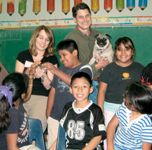Class is in session, and you're the teacher
Bring your knowledge and an animal or two-you'll be the greatest show on earth.

Dr. Francis Cipullo and practice manager Katie Caslow of Appalachian Animal Hospital show off animals at a school. If you want to visit classrooms, here are Dr. Cipullo's three tips: Let schools know you're available, fit in more than one class on a visit day, and don't overplan-have fun!Parents with schoolkids think Dr. Francis Cipullo, co-owner of Appalachian Animal Hospital in East Ellijay, Ga., is a class act. Why? On his days off he visits local classrooms-from kindergarten to high school-and teaches about basic biology, hygiene, and parasites along with careers in veterinary medicine.
"Parents appreciate another adult making this time investment in their children," Dr. Cipullo says.
Sometimes the payoff is monetary, says practice manager Katie Caslow. After students come home from a class on intestinal parasites-"Kids like all the gross things," she says-parents will seek out the clinic to deworm the family pets.
The biggest payoff, though, is in staff retention and satisfaction. Team members have even been inspired by Dr. Cipullo to make solo visits to classes themselves.
If you've always thought about visiting schools but never have, Dr. Cipullo says not to worry. It's not as hard as it sounds, and kids will automatically warm to you. After all, you present a change of pace-you can often get them outdoors.
Here's some advice to get you going on your own personal teacher tour.
Get the word out
Appalachian Animal Hospital sends an e-mail to the school district each fall, which then gets forwarded to teachers. It lets them know Dr. Cipullo is available for visits. The details of scheduling are handled with teachers on a one-on-one basis.
Double up
Dr. Cipullo takes team members' pets or animals from a wildlife rehabilitation center. It can take three hours to pick up the animals, drive them to the school for the visit, and return them afterward. Because of that, he crams as many classrooms as he can into a single day. He also keeps a close eye on animals to see if they're getting testy.
"Sometimes even the nicest baby opossum will have had enough of being touched by the end of the day," he says
Don't overprepare
Materials for a class visit can include a display with pictures and text off the Internet, animal coloring books, a slideshow on a laptop-or nothing at all. Check with the teacher on what topic to cover and be ready to answer questions. Dr. Cipullo shows kids pictures of animals, teaches them about personal hygiene and responsible pet care, or sets up stuffed animal hospitals for basic exams. Teens often want to talk about animal welfare, animal rights, or environmental issues. Whether you're toting a lovable baby for petting, a stern hawk for admiring, or just your own brain full of answers to questions, you're guaranteed to have a good time.
"It's not teaching as much as just sitting and having fun," Dr. Cipullo says. "Every time I go to a class, some kid comes out with something so funny and heartwarming that it makes my whole week."
Turnkey teaching
FutureVet, a program founded by the Banfield Charitable Trust, offers toolkits for veterinarians with ready-to-go school presentations targeted toward five different age groups. Each toolkit ($95) includes a presentation, overview guide, class materials, and 30 pet-related gift bags. Visit this website to find out more.